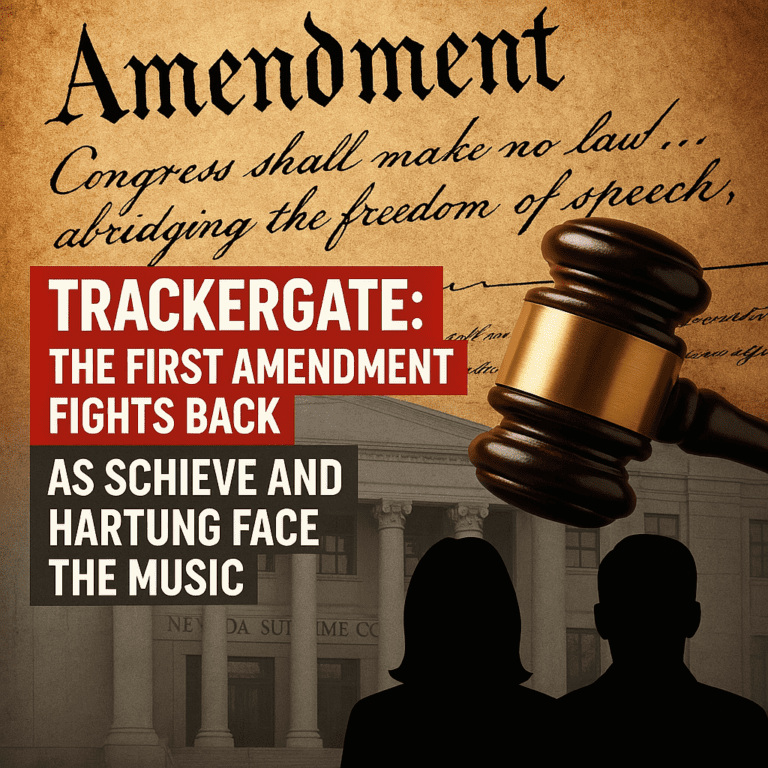Nevada Supreme Court Case Highlights Free Speech and Anonymity Rights
Date: April 8, 2025
Background of the Case
On April 8, 2025, the Nevada Supreme Court will conduct oral arguments in a pivotal case regarding free speech and anonymity. The case involves John Doe, an individual who retained a private investigator to uncover suspected corruption involving current Reno Mayor Hillary Schieve and former Washoe County Commissioner Vaughn Hartung. The focus of the dispute centers around Doe’s right to maintain his anonymity in the face of attempts by Schieve and Hartung to reveal his identity, claiming that their privacy rights outweigh his First Amendment protections.
The Investigative Actions
David McNeely, the private investigator hired by Doe, utilized GPS tracking on the vehicles of both Schieve and Hartung. Notably, these actions occurred prior to the enactment of Assembly Bill 356, which officially prohibited such methods starting July 1, 2023. This timeline raises questions regarding the legality of McNeely’s practices at the time, particularly since he acted without explicit permission from Doe, who sought information on alleged corruption but did not authorize tracking.
Recent Legal Developments
In December 2024, John Doe’s legal team, led by attorney Jeffrey Barr, filed a response to the claims made by Schieve and Hartung. The correspondence argues that employing a licensed private investigator to examine public officials is a protected form of speech under the First Amendment. Citing the precedent set in Perry v. Schwarzenegger, Doe’s counsel contends that his rights are under threat, and the plaintiffs have failed to demonstrate that unmasking Doe is crucial to their claims. The argument emphasizes that the court has allowed the use of pseudonyms to protect individuals from intimidation.
The Legal Controversy
While Schieve and Hartung assert that their privacy has been infringed upon, Doe’s defense maintains that no laws were broken and that he merely sought to investigate the conduct of individuals in public office. Unlike cases such as Dietemann v. Time, Inc., where a journalist engaged in trespass, Doe has not directly intruded upon anyone’s privacy. Instead, his actions are reminiscent of Tichinin v. City of Morgan Hill, which affirmed that hiring a private investigator to scrutinize public officials falls within the realm of protected speech.
The Potential Impact on Free Speech
Significantly, three individuals have approached media outlets, claiming to possess critical information concerning Schieve and Hartung. These sources are prepared to testify about allegations ranging from corruption to personal misconduct if the case progresses to trial. Therefore, if the court allows the case to move forward, the implications could be profound, potentially revealing substantial details about public officials’ conduct and creating a spectacle in the courtroom.
The Stakes of the Outcome
A central issue is the principle of accountability for public officials. If the court rules against Doe and unseals his identity, it could have a chilling effect on future investigations into misconduct, deterring concerned citizens from seeking accountability for fear of reprisal. This case poses critical questions about the balance between privacy rights of public figures and the essential freedoms guaranteed by the First Amendment.
Looking Ahead
As the Nevada Supreme Court hears the case, the outcome remains uncertain. Should the court side with Doe, it would uphold the principles of free speech and protection for anonymous whistleblowers. Conversely, a defeat for Doe could empower public officials to suppress dissent and discourage investigative journalism in the future.
For those interested in following the proceedings, the hearing will be streamed live at 2:30 PM PDT. You can access the live feed here.


